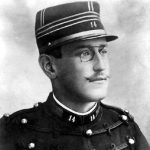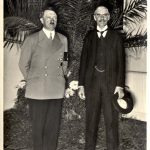Professional music critics tend to bicker over the greatness or otherwise of these two composers, born as almost exact contempories, within months of each other in 1813. Wagner was of course German, wrote opera principally, keeping wary of symphonies and concerti, though God knows what masterpiece he might have written if he had steered away from the human voice.
The Italian Verdi composed music across the board – opera, cantata, religious works (the Requiem is sublime), music for instruments, folksy songs.
Richard Wagner was born in Leipzig and lived, sometimes rather scandalously until 1883. His operatic works include The Flying Dutchman, Tannhäuser, Lohengrin, Die Meistersinger, Der Ring, Tristan and Isolda, Parsifal etc. These grand operas have been in constant production since his death, though many had difficulty finding finance, stages, musicians and/or singers during the composer’s lifetime. Wagner’s music exerts a hypnotic influence over listeners, who generally tend to be rabid fans capable of travelling a thousand miles or more to attend a performance, even a badly directed one.
The music is powerful, the effect shattering. It embodies the most astonishing characteristics of Germany. Adolf Hitler was one of the above-mentioned fans, because he lived in a Wagnerian dreamworld peopled by wholly Teutonic heroes. Wagner behaved in the grand manner, never took no for an answer, was arrogant, grandiose, tyrannical to the point of megalomania, revengeful, manipulating and capable of writing works of unparalled grandeur. He was also a womaniser though dirty in personal habits, showing dirty nails at the keyboard. His anti-Semitism is notorious. His methodology in getting people to finance his productions shows ruthlessness. He very nearly ruined Bavaria through its mad King Rudolf II, who thought he was in love with him (unrequited). He even built castles for him. He was certainly a genius, in the proper sense of that abused word, but he was not a sane genius.
Giuseppe Verdi was quite the contrary: born in Roncole, he lived until 1901 and wrote grand operas such as La Traviata, Il Trovatore, Don Carlos, Rigoletto, Aida, Othello and Falstaff. His Requiem is played and sung in both cathedral and village church, of whatever Christian faith. The singing of it at the funeral service for Diana, Princess of Wales stunned and silenced the millions of mourners surrounding the Cathedral and watching on their television sets. Verdi took the inexplicable human drama and set it to music. Even modern youngsters with their poor heads throbbing with Heavy Metal et al can be seduced into accepting that ‘Verdi is sensational, right? But Wagner sucks because it does go on for too long!’
Wagner wrote many of his own poetic lyrics, based on German national myth, combining his music with his poetry successfully, though to the uninitiated the result is often heavy and monotonous. His orchestration, like that of Richard Strauss, is the core of his music, though singers and players must be supremely strong in voice and body to perform it well.
Verdi composed some thrilling, moving, enthusing music in the tradition of Donizetti and Rossini, never forgetting, even in his later triumphs, that opera should be full of good tunes and entertaining. His plots might be silly (Il Trovatore, Don Carlos), but, as in a miracle, the music is so vital the opera reaches us leaving us punchdrunk. Given that modern directors are not permitted to spoliate through misunderstanding or misinterpretation of Verdi’s or Wagner’s music, they will live as long as culture exists. Shakespeare said ‘If Music be the food of Love, play on!’; I say, in respect of the impertinence of certain of today’s opera ‘directors’: “if music be the food of love, play on, and if not, shut up.”











Leave A Comment